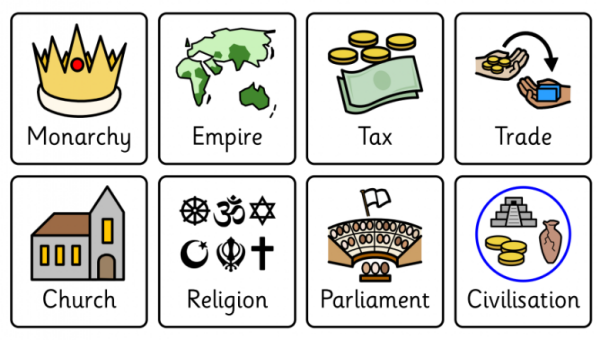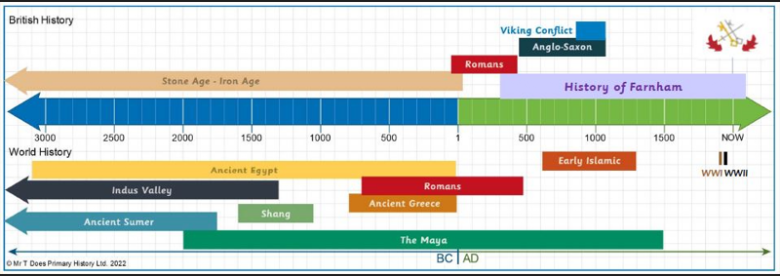History
All things are possible for one who believes – Mark 9:23
At Waverley Abbey we aim to develop world-aware historians who are able to understand and appreciate a wide variety of historical time periods and cultures from different viewpoints. We aim to equip children with the skills and tools to enable them to delve into historical times in creative and immersive lessons. We encourage children to think reflectively and critically examine sources of information. A Waverley Abbey historian will be taught to celebrate history’s achievements and to learn from the past.
Curriculum Intent
At Waverley Abbey, our pupils will become historians with a strong, chronological understanding of Britain’s history, within a global context. Pupils will explore the history of Farnham and its surrounding towns and will be able to explain how Farnham developed from the Roman occupation of Britain, through to the industrial revolution and beyond. We want to ensure that our pupils are exposed to a variety of cultures so that they can fully appreciate the richly diverse history of Britain. They will also be given opportunities to consider questions of social justice and inequality within the U.K and around the world. They will investigate and evaluate a range of primary and secondary source material and will be able to use these as evidence to form their own arguments for historical debates. Our pupils will understand that interpretations of historical events can differ and that historians sometimes change their views when new evidence is discovered. Each year, pupils will build upon the historical skills of enquiry and will be encouraged to make connections between the key concepts (monarchy, empire, tax, trade, church, religion, parliament and civilisation) in each area of historical study. Pupils will leave Waverley Abbey as confident historians, equipped with the necessary skills and knowledge to become well-rounded, educated citizens.
Pupils' understanding and enthusiasm for history is further enriched by our history-focused school visits, including Butser Ancient Farm and Farnham Castle, as well as by our special themed days, such as Anglo-Saxon Day.
Curriculum Implementation
Each year group teaches at least two history units throughout the year and these are evenly spaced out throughout the terms. We have an enquiry-based curriculum, with each topic focusing around a main question that has then been divided up into sub-questions (which may be answered over 1-to-2 lessons). These sub-questions encourage children to see history as an investigative subject. Each year group have multiple enrichment opportunities for history, including school trips and visitors/themed history days.
Our ‘Golden Words’ (Key concepts)

Our Waverley Abbey timeline

Curriculum Impact
The positive impact of our history curriculum can be seen through children’s growing chronological understanding of Britain’s history, within the context of wider world history. Children are developing their historical skills by asking questions and using primary and secondary source material to draw conclusions. Children can recognise that key concepts (such as religion, monarchy and empire) can be seen across multiple periods of history and can use this knowledge to compare civilisations across time. More should be done to ensure that key historical knowledge is committed to the children’s long-term memory.
If you would like to find out more about the curriculum please make an appointment to see your child's teacher who will be happy to discuss this with you. You can do this by contacting school through the office via - info@waverley-abbey.surrey.sch.uk.
